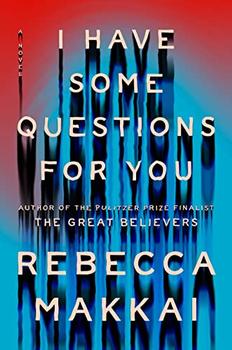Book Club Discussion Questions
Want to participate in our book club? Join BookBrowse and get free books to discuss!
Please be aware that this discussion guide will contain spoilers!
-
Several characters in I Have Some Questions for You reflect on their adolescent selves—versions of themselves that feel at once remote and familiar. Do you think it's possible, with enough distance, for any of us—including Bodie—to see our high school selves clearly? How do you think cultural norms have shifted since you were a teenager? How does Bodie's sense of herself, then and now, affect her understanding of Thalia's case?
-
True crime media has become exceedingly popular in recent years. Why do you think fans of the genre find it so fascinating and even therapeutic to dissect such gruesome events? What considerations factor into being an ethical creator or consumer of true crime media?
-
Bodie's husband, Jerome, is publicly accused of predatory behavior in a relationship with a younger woman. Were you surprised by the way Bodie handles the allegations, or the fact that she was pressured to address them in the first place? How has the advent of social media shaped how public opinion forms and evolves when an alleged crime is made public? How does an awareness of a wider audience affect Bodie's choices in her professional and private life?
-
On page 174, Bodie thinks, "Every article about Thalia's death had fixated on how Thalia and Robbie were the perfect prep school couple, moneyed and talented and privileged, and Omar Evans—no mention of his mother working at Dartmouth—was this outsider. That made the best narrative." How does the novel's setting shape the story, both past and present? How does prejudice and the idea of the "outsider" function at Granby and in the novel as a whole? Have you experienced any situations in your own life where the truth was warped by a community's biases?
-
On page 83, Omar's mother, Sheila Evans, says, "They made Omar out to be a bad person all-around. This one accusation wasn't enough, they have to say he was dealing drugs, he was a violent man, he was sleeping with students. They paint a whole picture. They talk about him as if he came from nowhere, as if he had no family." How does this resonate with media coverage you've witnessed in real life?
-
Reflecting on her reaction to Sheila Evans's account of what happened to Omar, Bodie thinks, "I hated that I was thinking about myself rather than becoming a pure vessel to absorb Sheila's grief, but the truth is that while anyone with a heart would have felt it break right then, my heart cracked along familiar fault lines" (pages 84–85). What does it mean for one's heart to break along "familiar fault lines"? What do you make of Bodie's—and other characters'—tendency to center themselves and their own grief and anxieties, even in the face of the profound suffering of Omar and his family? How do these frameworks shift over the course of the story?
-
Throughout the novel, we are reminded of how many stories of violence against women we regularly encounter on the news, on social media, and in pop culture—the contours of the cases hauntingly familiar even as locations and details differ. What was the cumulative effect of these references as you read? How did they inform your understanding of what happened to Thalia?
-
After hearing Beth's account of her own high school experience, Bodie stifles a fleeting urge to chime in with her own perception of the school's dynamics: "I'd learned long ago not to counter people's trauma with my own" (page 373). Discuss this revelation. When do the characters in this novel act empathetically and put their own egos aside, and when do they privilege their own versions of events?
-
Toward the end of the novel, on page 419, Bodie thinks, "I was wrong about you, too, Mr. Bloch, but I still don't feel that wrong. To put it another way: I was mistaken, but I wasn't incorrect." What do you think she means? Do you agree with her? Have you ever felt "mistaken, but [not] incorrect"?
-
Did this novel subvert or expand your knowledge of the criminal justice system? If so, how? What do you predict for the future of Omar's case?
-
Whom did you personally suspect over the course of the novel? Did your judgment ever differ from Bodie's? What surprised you the most as Bodie's understanding of the case evolved?
Unless otherwise stated, this discussion guide is reprinted with the permission of Viking. Any page references refer to a USA edition of the book, usually the trade paperback version, and may vary in other editions.
